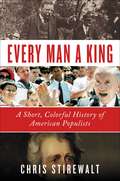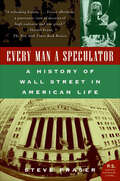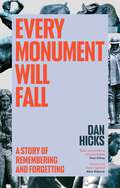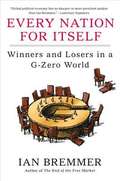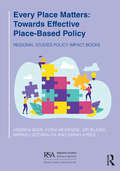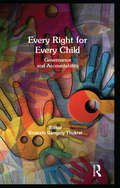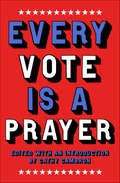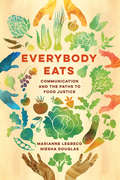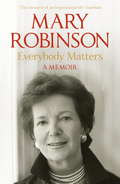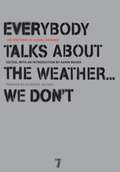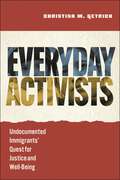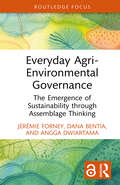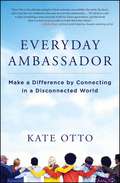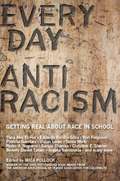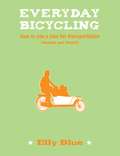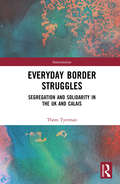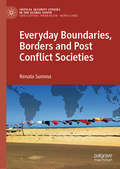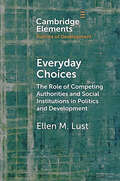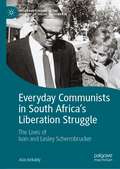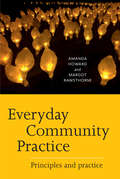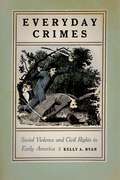- Table View
- List View
Every Human Intention: Japan in the New Century
by Dreux RichardA thoughtful, illuminating exploration of modern Japanese politics and culture through the eyes of an investigative reporter Dreux Richard presents post-Fukushima Japan in three illustrative parts. For six years, he follows members of Japan&’s Nigerian community, whose struggles with a hostile immigration system lead to the starvation death of a Nigerian immigrant in a Japanese detention center, investigated here for the first time. In Japan&’s northernmost city, Richard goes door to door with the region&’s youngest census employee, meeting the city&’s elderly residents and documenting the individual stories that comprise the nation&’s record-breaking population decline. Finally, he takes us into the offices of energy executives and nuclear regulators, as they fight to determine whether reactors threatened by earthquake faults will be permitted to restart after the Fukushima disaster, a conflict that brings the entire regulatory system to the brink of collapse. Richard&’s perceptive and probing reporting establishes him as an authority on his subjects, but he remains aware of his status as an outsider and interpreter for his readers. His long-term engagement with the personal lives of his sources revives the expatriate literary tradition of Lafcadio Hearn and Donald Richie, bringing its best qualities into a century where forensic investigation of wrongdoing and artful observation of its consequences are equally crucial. Through an exceptional range of approaches to an exceptionally complex society, Every Human Intention provides an understanding of today&’s Japan that goes far beyond politics, truisms, and sensational arguments.
Every Last Breath (Final Hour #1)
by Juno RushdanThe Clock Is Ticking:48 hours2 covert operatives 1 chance to get it right Maddox Kinkade is an expert at managing the impossible. Tasked with neutralizing a lethal bioweapon, she turns to the one person capable of helping her stop the threat in time: the love of her life, back from the dead and mad as hell at her supposed betrayal. Recruiting Cole to save millions of lives may be harder than resisting the attraction still burning between them, but Maddox will do whatever it takes, down to her final breath…even if it destroys her.When Maddox crashes back into Cole Matthews's life, he wants to fight back. He wants to hate her. But the crisis is too strong to ignore, and soon the two former lovers find themselves working side-by-side in a breakneck race to stop a world-class killer with a secret that could end everything.This isn't your ordinary FBI romantic suspense. These covert operatives breathe life into a race-against-time romantic thriller, perfect for fans of 24, J. D. Robb, and Mary Burton!What People Are Saying About Juno Rushdan:"Juno Rushdan is the real deal. Every Last Breath is an electric combination of heart-stopping thriller and swoon-worthy romance."—LEXI BLAKE, New York Times bestselling author"Tense and fulfilling. Settle back and savor this one."—STEVE BERRY, New York Times bestselling author"Fast-paced, intense, and sexy—a must-read romantic suspense!"—CYNTHIA EDEN, New York Times and USA Today bestselling author"A fast-paced, spine-tingling thriller you won't want to put down!"—LAURA GRIFFIN, New York Times bestselling author"A romantic thriller that handily juggles emotional intensity and a heart-pounding, James Bond-ian adventure."—Kirkus
Every Man a King: A Short, Colorful History of American Populists
by Chris StirewaltFrom Fox News' politics editor Chris Stirewalt -- a fun and lively account of America's populist tradition, from Andrew Jackson and Teddy Roosevelt, to Ross Perot, Pat Buchanan, and Donald Trump. p.p1 {margin: 0.0px 0.0px 0.0px 0.0px; font: 12.0px 'Helvetica Neue'; -webkit-text-stroke: #000000} span.s1 {font-kerning: none} Whatever the ideological fad of the moment, American populism has always been home to a fascinating assortment of charismatic leaders, characters, kooks, cranks, and sometimes charlatans who have - with widely varying degrees of success - led the charge of ordinary folks who have gotten wise to the ways of the swamp.This attitude of skeptical resentment also makes populism a fertile field for the work of conspiracy theorists and other enthusiastic apostates from civic convention. After all, if the people in power are found to be rigging one part of the system, why not the rest?EVERY MAN A KING tells the stories of America's populist leaders, from an elderly Andrew Jackson brutally caning his would-be-assassin, to William Jennings Bryan's pre-speech routine that combined equally prodigious quantities of prayer and food, to Ross Perot's military-style campaign that made even volunteers wear badges with stars to show rank. It is a rollicking history of an American attitude that has shaped not only our current moment, but also the long struggle over who gets to define the truths we hold to be self evident.
Every Man a Speculator: A History of Wall Street in American Life
by Steve Fraser“Big, boisterous, biting, and brilliant, this cultural history of Wall Street exposes Americans’ naughty ambition to worship both God and mammon.” —Walter A. McDougall, Pulitzer Prize–winning authorAmericans have experienced a love-hate relationship with Wall Street for two hundred years. Long an object of suspicion, fear, and even revulsion, the Street eventually came to be seen as an alluring pathway to wealth and freedom. Steve Fraser tells the story of this remarkable transformation in a brilliant, masterfully written narrative filled with colorful tales of confidence men and aristocrats, Napoleonic financiers and reckless adventurers, master builders and roguish destroyers. Penetrating and engrossing, this is an extraordinary work of history that illuminates the values and the character of our nation.“A rollicking history . . . Fraser affords us a panoramic view of decades of high endeavor and low greed.” —Harold Evans, The New York Times Book Review“Steve Fraser’s remarkable book on Wall Street explores nothing less than the history of capitalist culture in the United States.” —Sean Wilentz, Dayton-Stockton Professor of History, Princeton University“Written with verve, passion, and a remarkable command of vast historical literature, Every Man a Speculator illuminates Americans’ tortured relationship with Wall Street, from the days of Alexander Hamilton to the bubbles and frauds of the last few years.” —Eric Foner, DeWitt Clinton Professor of History, Columbia University“An illuminating tour of how the United States has perceived its financial center over two centuries through the eyes of its political leaders, novelists, moviemakers, preachers, cartoonists, ordinary citizens and a host of others.” —The Washington Post
Every Monument Will Fall: A Story of Remembering and Forgetting
by Dan Hicks‘An extraordinary intervention. If you want to understand the stakes and the limitations of contemporary conflict over culture and colonial history this bold, provocative book is an indispensable resource’ Paul Gilroy, founding Director of the Sarah Parker Remond Centre for the Study of Race and Racism at UCL‘Hicks’ must-read book describes how it was possible for a human skull to be made into a drinking cup and used in a genteel Oxford college, well into the 21st century, as if empire were an eternal state of nature . . . Read it to learn new ways to be anti-racist, abolitionist and to tell other stories than those commemorated by the monuments that surround us, from statues, to museums and the police’ Nicholas Mirzoeff, author of White Sight‘Brave and clear-sighted. Hicks opens up an extraordinary conversation between the past and the present. This is a book about falling statues, but so much more. It’s about how we’ve been lied to, and how we can approach the past with honesty. Hicks asks whether history and archaeology should be used to justify actions we know impinge on the rights of others - or to understand ourselves better’ Alice Roberts, bestselling author of Crypt ‘Dan Hicks writes with grace and fierce focus about what we choose to remember and why, in our patterns of thought, our institutions and the built environment in which we live’ Eyal Weizman, director of Forensic ArchitectureThe culture war is over. If you want it to be. It wasn’t even a culture war; it was a war on culture. A sustained attack, Dan Hicks argues, in the form of the weaponisation of civic museums, public art, and even universities — and one that has a deeper history than you might think.Tracing the origins of contemporary conflicts over art, heritage, memory, and colonialism, Every Monument Will Fall joins the dots between the building of statues, the founding of academic disciplines like archaeology and anthropology, and the warehousing of stolen art and human skulls in museums — including the one in which he is a curator.Part history, part biography, part excavation, the story runs from the Yorkshire wolds to the Crimean War, from southern Ireland to the frontline of the American Civil War, from the City of London to the University of Oxford — revealing enduring legacies of militarism, slavery, racism and white supremacy hardwired into the heart of our cultural institutions.Every Monument Will Fall offers an urgent reappraisal of how we think about culture, and how to find hope, remembrance and reconciliation in the fragments of an unfinished violent past. Refusing to choose between pulling down every statue, or living in a past that we can never change, the book makes the case for allowing monuments to fall once in a while, even those that are hard to see as monuments, rebuilding a memory culture that is in step with our times.
Every Nation for Itself
by Ian BremmerG-Zero -- \JEE-ZEER-oh\ --n A world order in which no single country or durable alliance of countries can meet the challenges of global leadership. What happens when the G20 doesn't work and the G7 is history. If the worst threatened--a rogue nuclear state with a horrible surprise, a global health crisis, the collapse of financial institutions from New York to Shanghai and Mumbai--where would the world look for leadership? The United States, with its paralyzed politics and battered balance sheet? A European Union reeling from self-inflicted wounds? China's "people's democracy"? Perhaps Brazil, Turkey, or India, the geopolitical Rookies of the Year? Or some grand coalition of survivors, the last nations standing after half a decade of recession-induced turmoil? How about none of the above? For the first time in seven decades, there is no single power or alliance of powers ready to take on the challenges of global leadership. A generation ago, the United States, Europe, and Japan were the world's powerhouses, the free-market democracies that propelled the global economy forward. Today, they struggle just to find their footing. Acclaimed geopolitical analyst Ian Bremmer argues that the world is facing a leadership vacuum. The diverse political and economic values of the G20 have produced global gridlock. Now that so many challenges transcend borders--from the stability of the global economy and climate change to cyber-attacks, terrorism, and the security of food and water--the need for international cooperation has never been greater. A lack of global leadership will provoke uncertainty, volatility, competition, and, in some cases, open conflict. Bremmer explains the risk that the world will become a series of gated communities as power is regionalized instead of globalized. In the generation to come, negotiations on economic and trade issues are likely to be just as fraught as recent debates over nuclear nonproliferation and climate change. Disaster, thankfully, is never assured, and Bremmer details where the levers of power can still be found and how to exercise them for the common good. That's important, because the one certainty of weakened nations and enfeebled institutions is that someone will try to take advantage of them. Every Nation for Itself offers essential insights for anyone attempting to navigate the new global playing field. .
Every Place Matters: Towards Effective Place-Based Policy (Regional Studies Policy Impact Books)
by Sarah Ayres Andrew Beer Markku Sotarauta Fiona McKenzie Jiří BlažekAcross the globe policy makers implement, and academics teach and undertake research upon, place-based policy. But what is place-based policy, what does it aspire to achieve, what are the benefits of place-based approaches relative to other forms of policy, and what are the key determinants of success for this type of government intervention? This Policy Expo examines these questions, reviewing the literature and the experience of places and their governments around the world. We find place-based policies are essential in contemporary economies, providing solutions to otherwise intractable challenges such as the long-term decline of cities and regions. For those working in public sector agencies the success or failure of place-based policies is largely attributable to governance arrangements, but for researchers the community that is the subject of this policy effort, and its leadership, determines outcomes. This Policy Expo explores the differing perspectives on place-based policy and maps out the essential components of effective and impactful actions by government at the scale of individual places.
Every Right for Every Child: Governance and Accountability
by Enakshi Ganguly ThukralDespite some acknowledgement over the years of the significance of seeing children as rights holders, children’s concerns continue to run the risk of not being considered political and mainstream: they continue to be viewed as extensions of adults or simply as members of families and communities. This when the reality is that children are citizens the minute they are born, and entitled to as much attention, if not more than adults, given their age and vulnerability. Concerned with the mainstreaming of children’s interests in policy-making, this book raises such questions as: What is good governance vis-à-vis children? What are the standards and indicators? Can there be one answer for this question that is applicable to all countries? In order to arrive at a better understanding of what good governance for children means and how the realization of the political, cultural, social and civil rights of children may be achieved, the book draws on the diverse and yet comprehensive body of knowledge that has developed over the years from initiatives taken by organisations across the world who work with policy makers to make governance systems more accountable and responsive to the well-being of children as citizens in themselves, simultaneously empowering children to take part in decision-making processes that impact their lives.
Every Vote Is a Prayer
by Cathy CambronAn inspiring history of the voting rights movement in America, from Frederick Douglass and Alice Paul to John Lewis, James Clyburn, and the Obamas. At the country&’s founding, voting rights were only extended to white male property owners. Although those rights had expanded to men regardless &“of their race, color, or previous condition of servitude&” in 1870, it wasn&’t until the Voting Rights Act of 1965 that barriers African Americans faced were struck down. Meanwhile, the fight for women&’s suffrage wasn&’t won until 1920. Native Americans finally gained citizenship and the right to vote in 1924, and young men of eighteen who faced military draft could not vote until 1971. For 250 years, Americans have marched and fought, been beaten and jailed—and even died—to win and protect the right to vote. Progress has been hard-won and incremental. In Every Vote Is a Prayer, Cathy Cambron chronicles those battles and urges us to remember, as Franklin D. Roosevelt said, &“Nobody will ever deprive the American people of the right to vote except the American people themselves―and the only way they could do that is by not voting at all.&”
Everybody Eats: Communication and the Paths to Food Justice (Communication for Social Justice Activism #3)
by Marianne LeGreco Niesha DouglasEverybody Eats tells the story of food justice in Greensboro, North Carolina—a midsize city in the southern United States. The city's residents found themselves in the middle of conversations about food insecurity and justice when they reached the top of the Food Research and Action Center's list of major cities experiencing food hardship. Greensboro's local food communities chose to confront these high rates of food insecurity by engaging neighborhood voices, mobilizing creative resources at the community level, and sustaining conversations across the local food system. Within three years of reaching the peak of FRAC's list, Greensboro saw an 8 percent drop in its food hardship rate and moved from first to fourteenth in FRAC's list. Using eight case studies of food justice activism, from urban farms to mobile farmers markets, shared kitchens to food policy councils, Everybody Eats highlights the importance of communication—and communicating social justice specifically—in building the kinds of infrastructure needed to create secure and just food systems.
Everybody Matters: A Memoir
by Mary RobinsonShortlisted for the Political Book Awards 2013 Political Book of the YearThe first woman President of Ireland, who became UN High Commissioner for Human Rights, Mary Robinson has spent her life in pursuit of a fairer world.Now, for the first time, she reveals what lies behind the vision, strength and determination that has helped her to achieve so much for human rights around the globe.She describes the upbringing which gave her her strong sense of values and how she came into painful conflict with her parents - marrying against their wishes and, later, helping to legalise contraception in a deeply Catholic Ireland.As a barrister she won landmark cases advancing the causes of women and the marginalised against the prejudices of the day. When - to the surprise of many - she became the first woman President of Ireland in 1990, she put Ireland firmly on the international stage.Accepting the position of UN High Commissioner for Human Rights in 1997 was her biggest challenge and here she describes the huge political difficulties she encountered among the many triumphs. Subsequently, based in New York, she led Realizing Rights for eight years, pioneering how to implement in practice economic and social rights: working in African countries on health, decent work, corporate responsibility and women's empowerment in peace and security. Now heading her own Climate Justice foundation she has succeeded in finding the independence she needs to work effectively on behalf of the millions of poor around the world most affected by climate change. Told with the same calm conviction and modest pride that has guided her life, Everybody Matters will inspire everyone who reads it with the belief that each of us can, in our own way, help to change the world for the better.
Everybody Talks About the Weather . . . We Don't: The Writings of Ulrike Meinhof
by Elfriede Jelinek Luise Von Flotow Ulrike Meinhof Bettina Rohl Karin BauerNo other figure embodies revolutionary politics and radical chic quite like Ulrike Meinhof, who formed, with Andreas Baader and Gudrun Ensslin, the Red Army Faction (RAF), also known as the Baader-Meinhof Gang, notorious for its bombings and kidnappings of the wealthy in the 1970s. But in the years leading up to her leap into the fray, Meinhof was known throughout Europe as a respected journalist, who informed and entertained her loyal readers with monthly magazine columns.What impels someone to abandon middle-class privilege for the sake of revolution? In the 1960s, Meinhof began to see the world in increasingly stark terms: the United States was emerging as an unstoppable superpower, massacring a tiny country overseas despite increasingly popular dissent at home; and Germany appeared to be run by former Nazis. Never before translated into English, Meinhof's writings show a woman increasingly engaged in the major political events and social currents of her time. In her introduction, Karin Bauer tells Meinhof's mesmerizing life story and her political coming-of-age; Nobel Prize-winning author Elfriede Jelinek provides a thoughtful reflection on Meinhof's tragic failure to be heard; and Meinhof 's daughter--a relentless critic of her mother and of the Left--contributes an afterword that shows how Meinhof's ghost still haunts us today.
Everyday Activists: Undocumented Immigrants' Quest for Justice and Well-Being
by Christina M. GetrichStrategies of resistance by undocumented young adultsAbout 825,000 of the more than two million undocumented young adults in the United States benefited from the Deferred Action for Childhood Arrivals (DACA) program started by President Obama in 2012. Through DACA, these young adults are able to work legally in the United States and have been insulated from deportation. However, since President Trump’s attempted termination of the program in 2017, DACA recipients have endured a rollercoaster of legal battles that have left them in an unimaginable state of prolonged limbo.Amid this rapidly shifting political climate, many undocumented young adults have joined the large-scale, high-visibility social movement to fight for policy change and immigrant justice. Yet often overlooked are the thousands more DACA recipients nationwide who have never participated in immigration-related activism. As Christina M. Getrich argues, in less publicly visible ways, they are nonetheless fighting for immigrant well-being and justice in their everyday adult lives, and their more private forms of action should be considered political activism. Drawing from five years of rich ethnographic research with a diverse population of thirty DACA recipients living in the Washington, D.C., area, Everyday Activists portrays the alternative political engagement strategies they enact in their daily lives as they leverage their unique knowledge bases and skill sets and make a meaningful impact in their communities. The volume reveals how these young activists’ strategies are instructive for thinking creatively about how to show up in our everyday lives for immigrants and others who are systematically subjected to social exclusion.
Everyday Agri-Environmental Governance: The Emergence of Sustainability through Assemblage Thinking (Routledge Focus on Environment and Sustainability)
by Jérémie Forney Dana Bentia Angga DwiartamaRevitalising the way the social sciences question agri-environmental governance, this book introduces "the everyday governance approach" as a means to improving the sustainability of agriculture and food systems.The "everyday" refers to localised practices, specific networks, and practical norms that emerge in a process of interaction, translation, and reinterpretation. The authors build this approach on assemblage thinking and theory, which focuses on the collective production of the social through complex sets of connections. For this reason, assemblage thinking becomes a particularly productive guide in exploring how everyday governance is co-produced in the interaction between numerous social processes involving a diversity of actors and instruments. The authors navigate between original and contrasting case studies from Switzerland, Indonesia, and the European Union in order to reorient attention to the transformative nature of governance, which they locate along four different dimensions of the everyday: (1) the interdependence of instruments within a wider governance assemblage; (2) the uncertainty and unpredictability of effects in agri-environmental governance; (3) the distributed nature of agency and its implication for power relations; (4) the importance of capacities in the transformation of agri-food systems. This book calls for a redesigning of agri-environmental governance that should move away from the setting of fix and precise objectives and solutions, and rather aim for a consolidation of sound foundations on which desirable futures can emerge.The book will be an essential read for students and scholars interested in sustainable agriculture and food systems, governance modes and approaches, and sustainability more broadly.
Everyday Ambassador: Make a Difference by Connecting in a Disconnected World
by Kate OttoIn Everyday Ambassador Kate Otto brings people together even as our digital networks pull us further apart.In a world of limitless technology, we are more connected than ever before but our hyper-connected lifestyles threaten our ability to know ourselves and interact with each other. By focusing on the four core values that allow us to become truly "connected" in tech-centric societies--empathy, patience, focus, and humility--Otto demonstrates that the power of technology is not in the tool, but in the intention of the person using it. Everyday Ambassador offers a unique solution to those who aspire to truly make a difference in the twenty-first century--revealing the secrets of how to unite people, even when technology keeps us at a distance from others--emotionally and physically. Otto helps us lift our heads up from our cell phones and tablets and take a look at the people standing right in front of us. In a time when good citizenship is the new currency of cool, Everyday Ambassador gives us the tactics to connect in our disconnected world.
Everyday Antiracism
by Mica PollockWhich acts by educators are "racist" and which are "antiracist"? How can an educator constructively discuss complex issues of race with students and colleagues? In Everyday Antiracism leading educators deal with the most challenging questions about race in school, offering invaluable and effective advice.Contributors including Beverly Daniel Tatum, Sonia Nieto, and Pedro Noguera describe concrete ways to analyze classroom interactions that may or may not be "racial," deal with racial inequality and "diversity," and teach to high standards across racial lines. Topics range from using racial incidents as teachable moments and responding to the "n-word" to valuing students' home worlds, dealing daily with achievement gaps, and helping parents fight ethnic and racial misconceptions about their children. Questions following each essay prompt readers to examine and discuss everyday issues of race and opportunity in their own classrooms and schools.For educators and parents determined to move beyond frustrations about race, Everyday Antiracism is an essential tool.
Everyday Bicycling
by Elly BlueEveryday Bicycling is a guide to everything you need to know to get started riding a bicycle for transportation. Elly Blue introduces you to the basics, including street smarts, bike shopping, dressing professionally, carrying everything from groceries to children to furniture, and riding in all weather. With its positive, practical approach, this book is perfect for anyone who has ever dreamed of riding a bicycle for transportation.
Everyday Border Struggles: Segregation and Solidarity in the UK and Calais (Interventions)
by Thom TyermanThis book examines everyday borders in the UK and Calais as sites of ethical political struggle between segregation and solidarity. In an age of mobility, borders appear to be everywhere. Encountered more and more in our everyday lives, borders locally enact global divisions and inequalities of power, wealth, and identity. Critically examining everyday borders in the UK and Calais, Tyerman shows them to be sites of ethical political struggle. From the Calais ‘jungle’ to the UK’s ‘hostile environment’, it shows how borders are carried out through practices of everyday segregation that make life for some but not others unliveable. At the same time, it reveals the practices of everyday solidarity with which people on the move confront these segregating borders. This book sheds light on the complex ways borders entrench themselves in our lives, the complicity of ordinary people in their enactment, and the seductive power they continue to assert over our political imaginations. Of general interest to scholars and students working on issues of migration, borders, citizenship, and security in international politics, sociology, and philosophy this book will also appeal to practitioners in areas of migrant rights, asylum advocacy, anti-detention or deportation campaigning, human rights, direct democracy, and community organising.
Everyday Boundaries, Borders and Post Conflict Societies (Critical Security Studies in the Global South)
by Renata SummaThis book provides an in-depth analysis of border and boundary enactments in post-war and “deeply divided” societies. By exploring everyday places in post-conflict societies, it critically examines official narratives of how ethno-national divisions arise and are sustained. It challenges traditional accounts regarding the role that international intervention has in producing and/or weakening boundaries in such societies, while questioning clear-cut distinctions between the local and the international.
Everyday Choices: The Role of Competing Authorities and Social Institutions in Politics and Development (Elements in the Politics of Development)
by Ellen M. LustScholars and practitioners seek development solutions through the engineering and strengthening of state institutions. Yet, the state is not the only or the primary arena shaping how citizens, service providers and state officials engage in actions that constitute politics and development. These individuals are members of religious orders, ethnic communities, and other groups that make claims on them, creating incentives that shape their actions. Recognizing how individuals experience these claims and view the choices before them is essential to understanding political processes and development outcomes. This Element establishes a framework elucidating these forces, which is key to knowledge accumulation, designing future research and effective programming. Taking an institutional approach, this Element explains how the salience of arenas of authority associated with various communities and the nature of social institutions within them affect politics and development. This title is also available as Open Access on Cambridge Core.
Everyday Communists in South Africa’s Liberation Struggle: The Lives of Ivan and Lesley Schermbrucker (Palgrave Studies in the History of Social Movements)
by Alan KirkaldyThis book explores the role of social movements in the Southern African liberation struggle, through the lens of two ‘everyday communists’. Focusing on the Communist Party of South Africa (CPSA), the author explores the lives of Ivan and Lesley Schermbrucker, whose contribution to the party was more clandestine than that of leaders such as Bram Fischer and Joe Slovo. They represent how ‘ordinary’ people could play significant roles based on stances more rooted in common decency and morality than in Marxist theory. The book also sheds light on the interplay between transnational and national tendencies during the liberation movement, particularly between the 1940s and the 1960s. The Schermbruckers changed their views in response to the shifting national and international political landscape, the rise of Stalinism, and the flight of South African activists into exile from the 1960s. Both fluent in African languages, they were able to create relationships of trust with African members of the CPSA. Examining tensions and conflicts during the liberation struggle, this book provides fresh insights into ‘underground’ activism.
Everyday Community Practice: Principles and practice
by Amanda Howard Margot RawsthorneIncreasingly students and practitioners in human services are asked or seek to include community engagement, participation and capacity building in their work with groups. In this book expert authors Amanda Howard and Margot Rawsthorne provide guidance on the theory and practice of working with communities, from preliminary planning and scoping before direct work with the community begins, through to evaluation. They explore key issues including developing an understanding of community life, facilitating and supporting community action, understanding and acting on structural inequity, managing negotiation and conflict, and building productive networks. They draw extensively on their own work with communities and research to create a dialogue with the reader on the interaction of task and process in everyday community practice.Written in a friendly and accessible style and featuring the voices of community workers throughout, this is a vital guide for anyone seeking to encourage positive change in an important field of practice.'This is a splendid addition to the community work literature, offering wise and judicious guidance for those engaged knee-deep in community practice … it acknowledges that the increasing emphasis on individualised service options has too often led to the neglect of understanding the benefits of collective action within diverse and dynamic communities.' - Dr Winsome Roberts, Honorary Senior Fellow, Department of Social Work, University of Melbourne
Everyday Crimes: Social Violence and Civil Rights in Early America
by Kelly A RyanThe narratives of slaves, wives, and servants who resisted social and domestic violence in the nineteenth centuryIn the early nineteenth century, Peter Wheeler, a slave to Gideon Morehouse in New York, protested, “Master, I won’t stand this,” after Morehouse beat Wheeler’s hands with a whip. Wheeler ran for safety, but Morehouse followed him with a shotgun and fired several times. Wheeler sought help from people in the town, but his eventual escape from slavery was the only way to fully secure his safety. Everyday Crimes tells the story of legally and socially dependent people like Wheeler—free and enslaved African Americans, married white women, and servants—who resisted violence in Massachusetts and New York despite lacking formal protection through the legal system. These “dependents” found ways to fight back against their abusers through various resistance strategies. Individuals made it clear that they wouldn’t stand the abuse. Developing relationships with neighbors and justices of the peace, making their complaints known within their communities, and, occasionally, resorting to violence, were among their tactics. In bearing their scars and telling their stories, these victims of abuse put a human face on the civil rights issues related to legal and social dependency, and claimed the rights of individuals to live without fear of violence.
Everyday Eating: Food, Taste and Trends in Britain since the 1950s
by Alan WardeHow have eating habits changed in recent decades? What does it mean to eat well? This fascinating book examines continuity and change in food consumption and eating patterns since the 1950s. The culinary landscape of Britain is explored through discussion of commodification, globalisation and diversification enabling an understanding of both developing trends and enduring habits. The author’s research undertaken over 40 years offers fresh insights into such practices as everyday meals, shopping, cooking and dining out and how these are shaped by demographic, social and cultural processes. The book provides a comprehensive and engaging analysis of eating in Britain today and of the many controversies about how this has changed.
Everyday Ecofascism: Crisis and Consumption in American Literature
by Alexander MenriskyA timely look into how fascist ideas permeate contemporary culture well beyond the far right As challenges posed by climate change have intensified in the twenty-first century, right-wing figures in the United States and abroad have increasingly framed anti-immigrant, anti-Indigenous, and white-supremacist sentiments in terms of environmental survival. Everyday Ecofascism explores the insidious nature of this tendency, revealing how permutations of these perspectives in fact resonate across the political spectrum. Drawing on comparative studies of fascism writ large, Alexander Menrisky demonstrates that ecofascism is best understood not as a uniquely right-wing ideology but as a political genre that reinforces white supremacy and other forms of domination. Presenting a view of fascism as a complex power network that plays out on scales both large and small, Menrisky shows how extremist sentiments have crept into everyday language, stories, and ideas. Through a literary and cultural studies lens, he illuminates ecofascism&’s narrative patterns and their easy permeation of environmentalist discourses, from back-to-the-land movements to the resurgence of psychedelic drugs, food localism, and pandemic politics. Opposite his analysis of ecofascism in action, Menrisky sheds important light on narrative resistances to dominant conceptions of race, nation, and territory by Native, queer, and women-of-color writers who have countered ethnonationalism for generations. Bridging past and present, Menrisky powerfully nails down the emergent concept of ecofascism and forms a basis for understanding phenomena like Covid-19, ecological utopianism, and psychedelic environmentalism that detangles ecofascist tendencies from justice-oriented visions of place-based belonging. Retail e-book files for this title are screen-reader friendly.


